●あなたは.外国人の知り合い(Alex)から.E メールで質問を受け取りました(一か所に”下線部”があります。この質問にわかりやすく答える返信メールを,「解答記入欄」に英文で書きなさい。
●あなたが書く返信メールの中で,AlexのEメール文中の “下線部” について,あなたがより理解を深めるために,”下線部” の特長を問う具体的な質問を2つしなさい。
●あなたが書く返信メールの中で 「解答記入欄」に書く英文の語数の目安は40 語~50 語です。
●「解答記入欄」の下の Best wishes, の後にあなたの名前を書く必要はありません。
=======================================
Lesson 1.
Hi!
I’m working on a school project about traditional celebrations around the world. Next week, I have to present about “New Year’s Eve celebrations” in different cultures. I remember you mentioning how special it is in your country. Could you tell me more about how you celebrate it? Are there any unique traditions or foods involved? I’m really excited to learn and share this information!
Your friend,
Alex

====================================================
Lesson 2
Hi!
For my world cultures class, we’re discussing “traditional family gatherings” around the globe. I remember you mentioned that family plays a big role in your culture. Could you share more about a typical family gathering in your country? What activities do you do, and are there any special dishes that are always prepared? I’m eager to learn and compare it with our traditions!
Best regard

=============================================================
Lesson 3
Hi!
I’ve been exploring various global music genres and I’m intrigued by traditional Japanese music. I’ve heard a little about the “koto and shamisen.” Could you explain more about these instruments and the type of music they’re used in?
Your friend,
Alex

=================================================================
Lesson 4.
Hi!
I’m working on a project about global food culture. I’m curious about “Japanese street food.” What are some popular street foods in Japan, and how do they reflect the local culture and lifestyle?
Your friend,
Alex
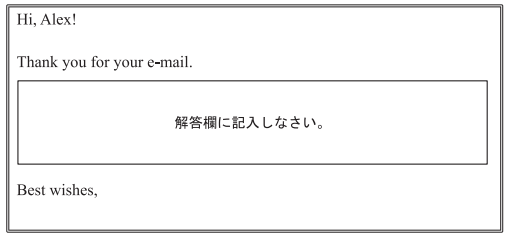
================================================
Lesson 5
Hi!
I’m working on a tourism project and focusing on inbound travel to Japan. I’m curious about the “attractions and experiences” that draw international visitors to Japan’s ancient capitals like Kyoto and Nara. What makes them so appealing to tourists?
Your friend,
Alex
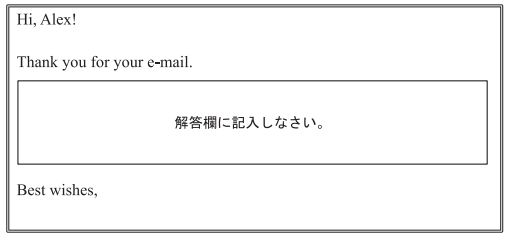
======================================================
Lesson 6.
Hi!
I recently tried conveyor belt sushi for the first time and loved it! I’m interested in “the history and popularity” of this dining style in Japan. How did it start, and why do you think it became so popular, both in Japan and globally?
Your friend,
Alex
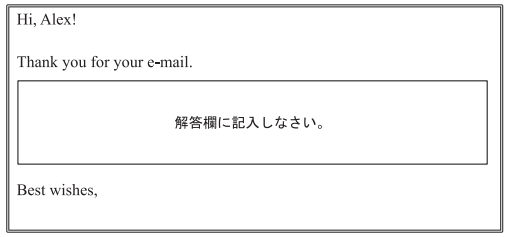
=======================================================
Lesson 7.
Hi!
I’m planning a winter trip to Japan and I’m really excited about visiting hot springs. Can you tell me about the “cultural significance and etiquette” of hot springs in Japan? I want to make sure I respect the traditions.
Your friend,
Alex
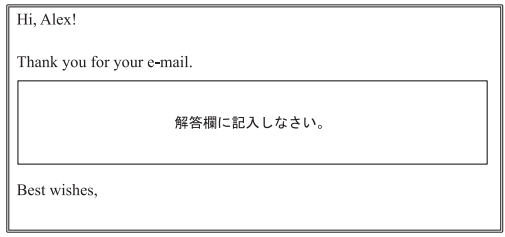
========================================================
Lesson 8.
Hi!
I’ve noticed that SNS platforms are used differently in Japan compared to my country. I’m curious about the “role and impact” of SNS in Japanese society. How do people in Japan typically use these platforms, and what’s their influence on daily life?
Your friend,
Alex
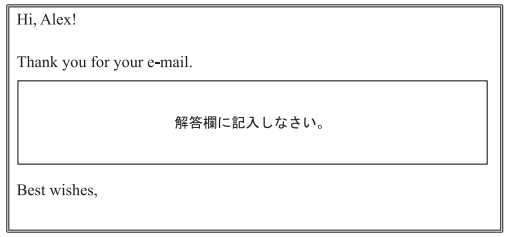
=======================================================
Lesson 9
Hi!
I’m fascinated by the firework displays I’ve seen in Japanese dramas. I heard summer fireworks are a big thing in Japan. Can you tell me more about the “tradition and significance” of fireworks in Japanese culture? What do they symbolize?
Your friend,
Alex
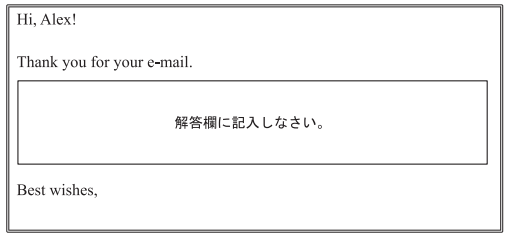
==========================================================
Lesson 10
Hi!
I’m amazed at how smartphones have changed daily life globally. I’m interested in “the impact of smartphones on Japanese society.” How have smartphones, or ‘smaho’, influenced lifestyle, work, and communication in Japan?
Your friend,
Alex
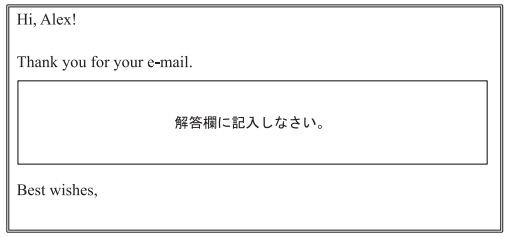
===================================================
Lesson 11
Hi!
I’m a big fan of smartphone games and I know Japan has a huge market for them. Can you tell me about the “popularity and trends” of smaho games in Japan? What makes them so appealing, and which are the most popular?
Your friend,
Alex
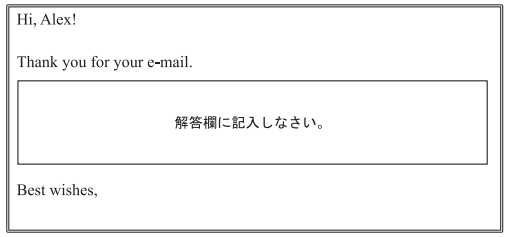
===================================================
Lesson 12.
Hi!
Autumn in Japan seems beautiful, especially with the autumn leaves. I’m planning a trip to experience this. Can you suggest the “best places and times” to see the autumn leaves? I want to capture the most scenic views.
Your friend,
Alex
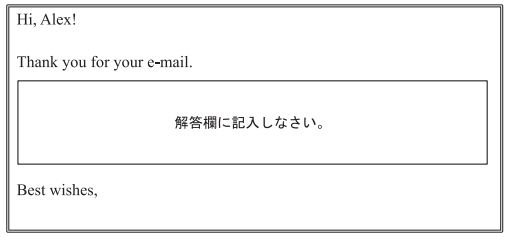
Model Answer:
Viewing autumn leaves in Japan is a wonderful experience. Are you looking for spots in the mountains or in cities? Also, which part of Japan are you planning to visit? Kyoto and Hokkaido are famous for their autumn scenery, best viewed from mid-October to late November.
====================================================
Lesson 13
Hi!
I’m doing a project on global responses to intense heat and climate change. I’ve heard Japan experiences intense heat in summer. Can you tell me about “measures and adaptations” in Japan to cope with high temperatures? How do people stay cool?
Your friend,
Alex
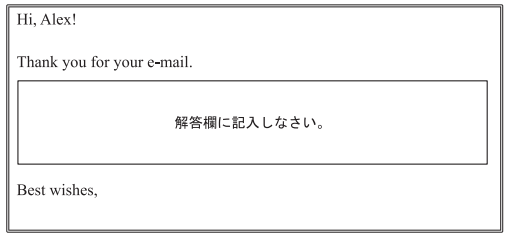
======================================================
Lesson 14.
Hi!
I’m a huge baseball fan and I’ve heard that it’s very popular in Japan too. I’m especially interested in Shohei Ohtani’s career. Can you tell me about the “popularity of baseball” in Japan and how players like Ohtani have influenced the sport?
Your friend,
Alex
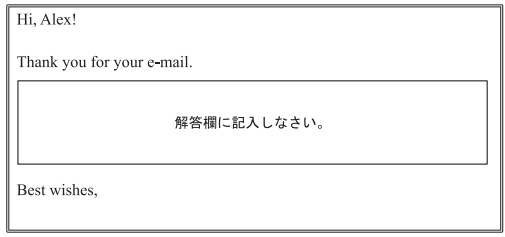
=======================================================
Lesson 15
Hi!
I’m part of a school club that’s creating a guide on “leisure activities worldwide.” Could you tell me about popular leisure activities in your country? What do people typically do in their free time? Are there any activities that are unique to your culture or region? Understanding how people relax and enjoy themselves in different parts of the world is fascinating to me. I’m excited to learn more about your country’s leisure culture.
Best,
Alex

===============================================
Lesson 16.
Hi!
In my world cultures class, we’re exploring “traditional family roles.” Could you share how family roles are typically viewed in your country? Are there specific responsibilities or expectations for different family members? Also, have these roles changed over time, or do they remain deeply rooted in tradition? I’m curious about the similarities and differences in family dynamics globally. Your perspective would be really helpful for my class project.
Best regards,
Alex
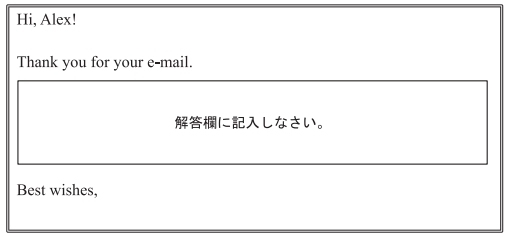
===================================================
Lesson 17.
Hi!
For my environmental studies course, we’re researching “urban green spaces” around the world. I’d like to know about the parks or public gardens in your city. How do these spaces impact urban life? Are they widely used by residents? Additionally, are there any unique features or conservation efforts associated with these green spaces? Learning about different approaches to urban nature is crucial for our study on sustainable city living.
Many thanks,
Alex
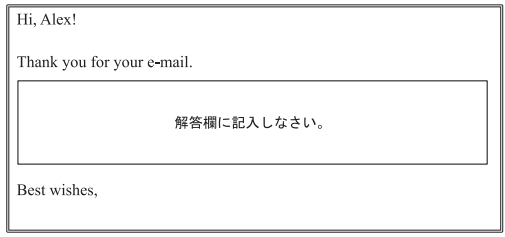
=================================================
Lesson 18.
Hi!
I’m working on a sociology project about “community events and festivals.” What are some significant community events or festivals in your country? How do they bring people together, and what activities are involved? Also, do these events have historical or cultural significance? Understanding how communities celebrate and bond is essential to my project. I’d really appreciate it if you could share some details about the festivals and events that are important in your society.
Kind regards,
Alex
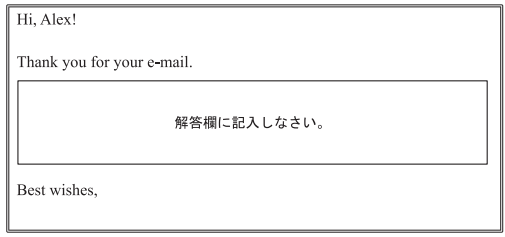
===================================================
Lesson 19.
I’m excited about the upcoming school festival. Our class decided to have a “Japanese tea ceremony” booth. It’s a big part of our culture, but I’m not sure about the correct steps. Can you tell me more about how to prepare and present the tea properly?
Your friend,
Alex
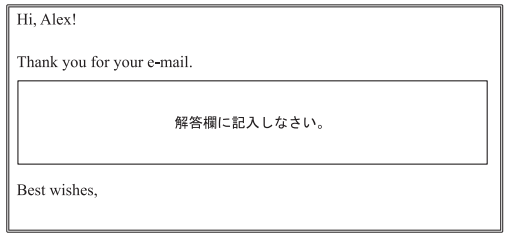
================================================
Lesson 20.
Hi!
In my global health class, we’re discussing “dietary habits and health.” What are common dietary habits in your country? How do these habits relate to overall health and wellness? Are there any specific foods or eating patterns that are particularly emphasized? It’s fascinating to see the connection between diet and health in different cultures. Any information you share will be valuable for my class discussion.
Best,
Alex
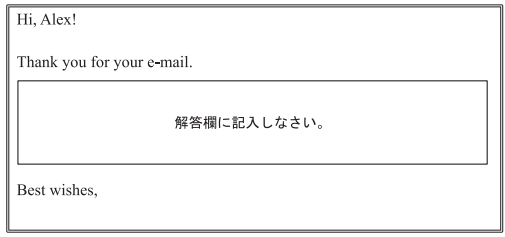
==================================================
Lesson 21.
Hi!
I’ve been watching a lot of historical movies lately. They made me curious about samurai culture. What’s the most fascinating aspect of “samurai history” for you? I’d love to learn more from a local perspective.
Your friend,
Alex
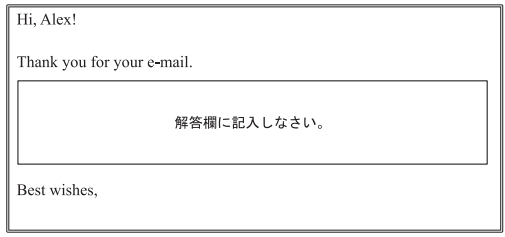
=====================================================
Lesson 22.
Hi!
I’m creating a presentation about “unique celebrations” around the world. I remember you mentioning a special festival in your country. Could you describe what makes this festival unique? What activities are involved, and is there special food or music? Also, how do people in your community prepare for it? I’m excited to include this in my presentation to highlight cultural diversity.
Best,
Alex
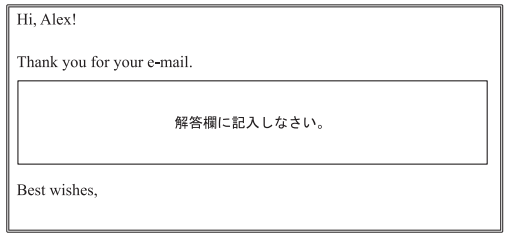
===================================================
Lesson 23.
Hi!
I’m part of a project studying “traditional games” from different countries. Could you tell me about a popular traditional game in your country? How is it played and what are the rules? Also, does this game have any cultural or historical significance? I find it fascinating how games reflect cultural values. Any details you provide will be valuable for understanding the cultural context of these games.
Thanks,
Alex
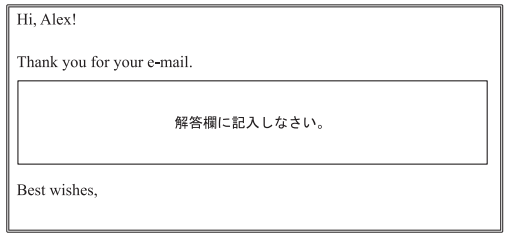
==================================================
lesson 24.
Hi!
For my art class, we’re exploring “street art in different cultures.” I’m curious about the street art scene in your city. What themes do artists typically explore, and are there any famous murals or artists? Also, how is street art perceived in your community? Is it seen as a form of expression or merely graffiti? Understanding different perspectives on street art will add depth to my project.
Kind regards,
Alex
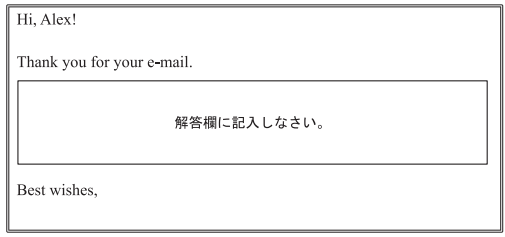
==================================================
lesson 25.
Hi!
For my science project, I’m focusing on renewable energy sources. I heard Japan is doing a lot in this field. Can you share some insights on “Japan’s approach to renewable energy”? I think it could really help my project.
Your friend,
Alex
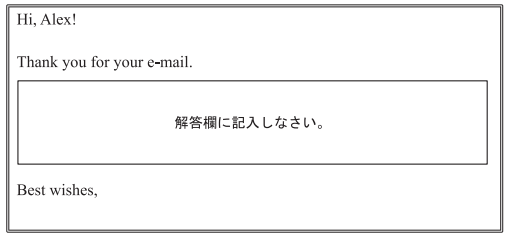
================================================
Lesson 26.
Hi!
I’m planning to visit Japan next summer. I want to explore both the urban and rural areas. Do you have any recommendations for “must-visit places” in Japan that are not too touristy? I’d like to experience the authentic Japanese lifestyle.
Your friend,
Alex
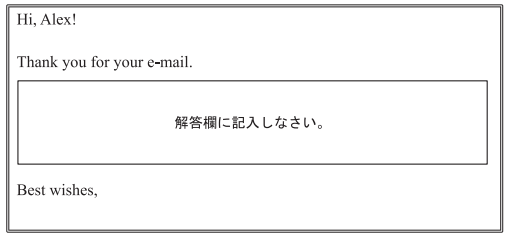
=================================================
Lesson 27
Hi!
I’ve been trying to learn Japanese by watching anime. It’s fun, but I’m not sure if it’s effective. What do you think about “learning a language through media”? Do you have any tips for making it more effective?
Your friend,
Alex
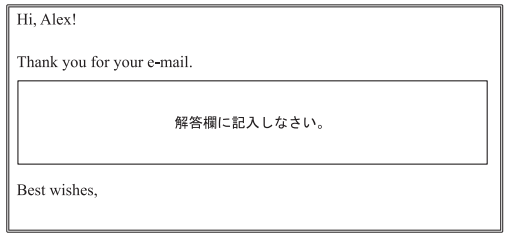
==================================================
Lesson 28
Hi!
I’m doing a project on global fashion trends and how they influence local styles. Japan seems to have a unique fashion scene. Can you tell me more about “Japan’s current fashion trends”? I’m curious about the youth culture.
Your friend,
Alex
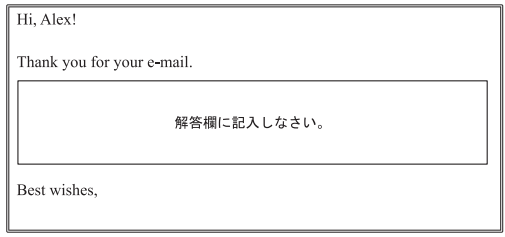
================================================
Lesson 29
Hi!
I just read about Japan’s advanced technology in robotics and AI. It’s fascinating! Can you tell me how this technology is “integrated into everyday life” in Japan? I’m curious about its impact on daily activities.
Your friend,
Alex
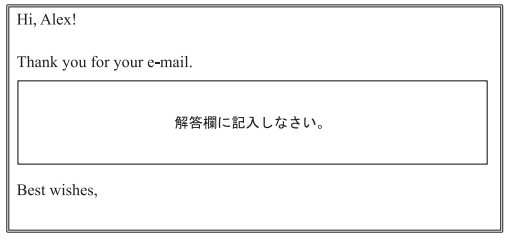
=================================================
Lesson 30
Hi!
Our school’s sports club is interested in learning about traditional Japanese sports. We know about sumo, but are there any other “traditional sports” we should explore? I think it would be great for our cultural exchange program.
Your friend,
Alex
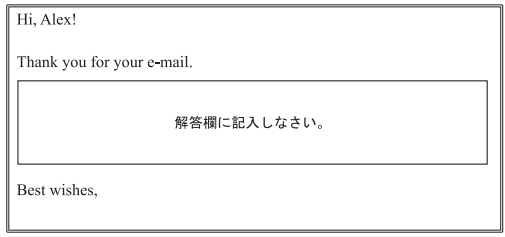
===================================================
Lesson 31
Hi!
In my world literature class, we’re discussing Japanese poetry. I find the structure of “haiku and tanka” poems fascinating. Could you explain the key differences between these two forms and their role in Japanese literature?
Your friend,
Alex
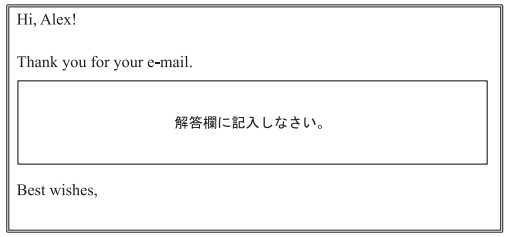
=================================================
Lesson 32
Hi!
I’m working on a cultural exchange program and researching “holiday traditions.” Can you share how you celebrate a major holiday in your country? What are the typical customs, foods, and activities? Also, has the way this holiday is celebrated changed in recent years? I’m eager to learn about the blend of tradition and modernity in holiday celebrations.
Kind regards,
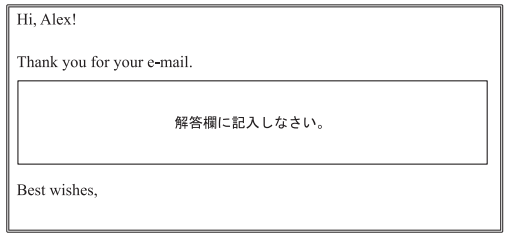
================================================
Lesson 33
Hi!
In my music appreciation class, we’re studying “instruments unique to different cultures.” I’m interested in learning about a musical instrument that’s special to your country. Can you describe its appearance, how it’s played, and the type of music it’s used for? Also, is it still commonly used today, or is it more of a historical instrument?
Thanks a lot,
Alex
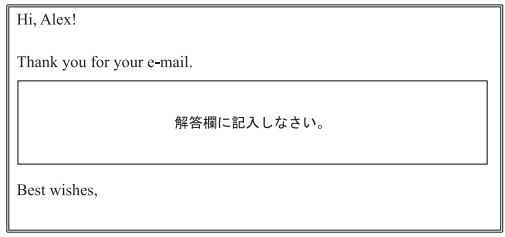
==========================================================
Lesson 34
Hi!
For my world literature class, we’re exploring “famous authors and their impact.” Could you tell me about a renowned author from your country? What are their most notable works, and why are they significant? Also, how have their writings influenced your country’s literature and culture? I’m fascinated by how authors can shape cultural and literary landscapes.
Best wishes,
Alex
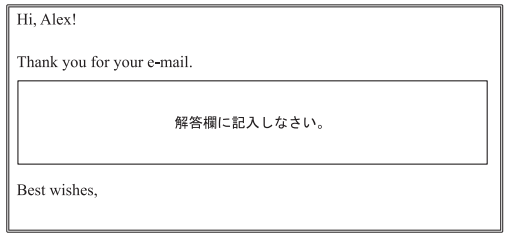
=====================================================
Lesson 35
Hi!
For my art class, I’m doing a project on contemporary Japanese artists. I’m particularly interested in those who blend traditional and modern styles. Could you tell me about some “influential contemporary artists” in Japan and their works?
Your friend,
Alex
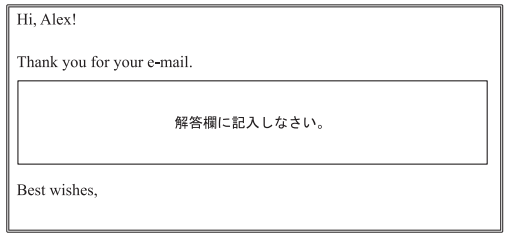
=========================================================
Lesson 36
Hi!
In my social studies class, we’re discussing “community service and volunteerism.” What types of community service initiatives are common in your country? How do people get involved, and what impact do these initiatives have? Also, is volunteerism widely encouraged or practiced? Learning about community engagement in different cultures is crucial for our understanding of global social responsibility.
Best,
Alex
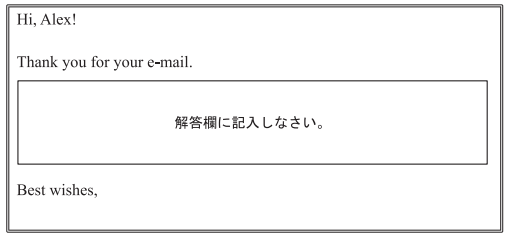
===================================================
Lesson 37
Hi!
In my world religions class, we’re learning about “religious festivals and their significance.” Could you describe a major religious festival in your country? What are the customs and rituals involved, and what is its spiritual significance? Also, how does this festival bring together the community? I’m interested in how religious observances foster community and cultural identity.
Sincerely,
Alex
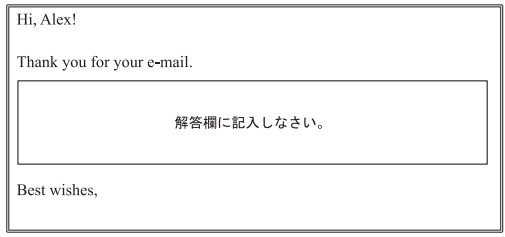
==============================================
Lesson 38
Hi!
I’m working on a project about technological advancements in healthcare. I’ve read that Japan is leading in this area. Can you tell me about some “innovative technologies or practices” in Japanese healthcare? I’m particularly interested in how they improve patient care.
Your friend,
Alex
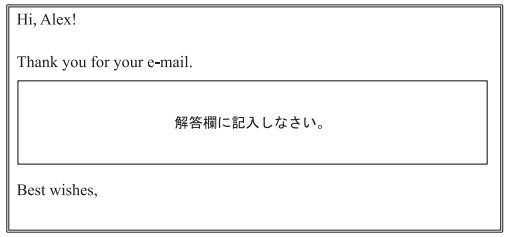
==================================================
Lesson 39
Hi!
I’m curious about Japan’s approach to space exploration. I know Japan has made significant contributions, but I’d like to know more about “recent projects or advancements” in Japanese space research. Can you share some details?
Your friend,
Alex
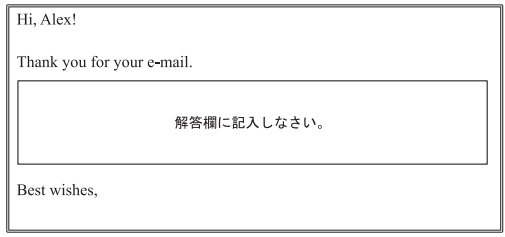
====================================================
Lesson 40
Hi!
I’m planning a school project on global animation industries. Japanese anime seems to have a huge global influence. Can you discuss “the evolution and impact” of anime in Japan and worldwide? I’m interested in its cultural significance.
Your friend,
Alex
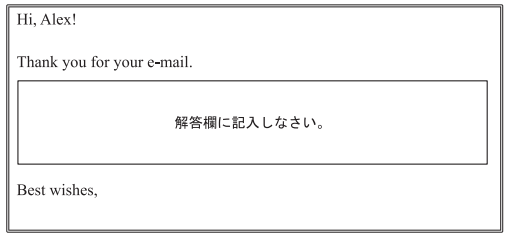
============================================-=====







